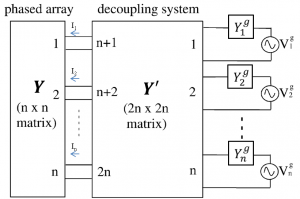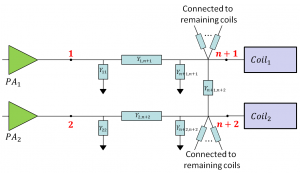Decoupling of Parallel Transmission Arrays in Magnetic Resonance Imaging
- Category: Medical Electronics
- Tags: luca daniel, zohaib mahmood
In coupled parallel transmission (pTx) arrays, the power delivered to a channel is partially transmitted to other channels and partially dissipated in the circulators. As a result, for the same tradeoff between specific absorption rate (SAR) and excitation fidelity, coupled pTx arrays require more input power compared to uncoupled ones. Ladder networks have been proposed for decoupling pTx coils, but they are difficult to build and unreliable because of their high sensitivity to specific tuning and matching conditions of the array[1]. A secondary approach of pre-adjusting the low-power or digital waveforms could provide uncoupled B1+ array patterns but would not solve the problem of lost power due to destructive interference at the ports of the array or loss of reflected/coupled power into the input of the RF amp or circulator.
In this work, we are developing an automated technique to design generic high-power decoupling systems interfaced between the RF amplifiers and the coil, as shown in Figure 1. The decoupling system mixes the input signals and is also optimized to ensure that all forward power goes into the patient. The algorithm optimally selects a robust decoupling system based on the constraints defined on the network such as reciprocity, passivity, and the network’s being lossless[2]. Additionally, to reduce the number of reactive elements used in the decoupling network, we enforce the decoupling matrix to be sparse or to have a desired structure. We show that our algorithm converges and the decoupling matrix achieves ideal or near-ideal decoupling. We explore various useful features of the decoupling network by analyzing L-curves and singular values. Figure 2 shows building block of one of the many sparse and structured decoupling systems designed by our algorithm.
- Figure 1: Block diagram of the connected blocks. The decoupling system is connected between the phased array and the power sources.
- Figure 2: Building block of a structured and sparsified decoupling system. The elements labeled as Y’s indicate reactive elements.
- J. Jevtic, “Ladder Networks for Capacitive Decoupling in Phased-Array Coils,” in Proc. of 9th Annual Meeting & Exhibition of International Society for Magnetic Resonance in Medicine (ISMRM), 2001. [↩]
- Z. Mahmood, B. Guérin, E. Adalsteinsson, L. Wald, and L. Daniel, “An Automated Framework to Decouple pTx Arrays with Many Channels,” in Proc. of 21st Annual Meeting & Exhibition of International Society for Magnetic Resonance in Medicine (ISMRM), Apr. 2013. [↩]

